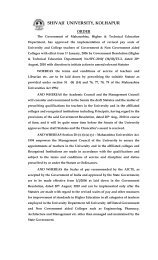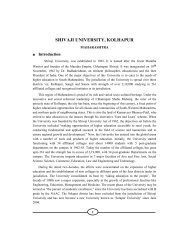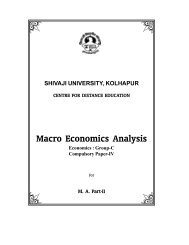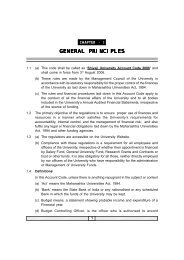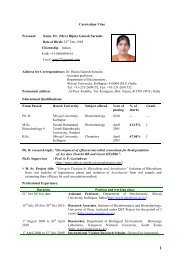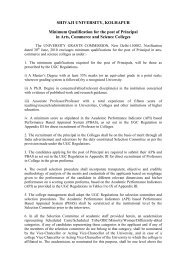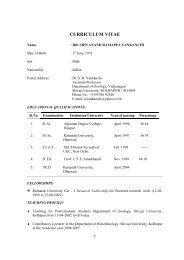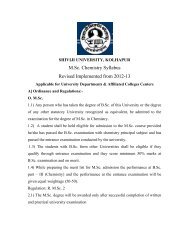Economics(Paper-4) - Shivaji University
Economics(Paper-4) - Shivaji University
Economics(Paper-4) - Shivaji University
Create successful ePaper yourself
Turn your PDF publications into a flip-book with our unique Google optimized e-Paper software.
in the economy. It is a fact that development of a country can be achieved through<br />
various variables such as agriculture, capital, Industry, monetary and fiscal policy and<br />
government approach etc. In this unit we are dealing the fact that how these variables<br />
are contributing for the economic development of a country. Not only this, it tells us that<br />
what changes should be followed in the various factors to achive the desired economic<br />
growth.<br />
3.2 Subject Matter :<br />
3.2.1 Capital formation and Economic Development :<br />
A) Meaning of Capital formation<br />
1) Bom Bowark said that, “Capital is produced means of production.” In economic<br />
the capital is not a money but it consists machinery, tools, factory buildings i.e. all the<br />
real assets.<br />
2) Ragnar Nurkse defines capital formation as follows, “The meaning of ‘Capital<br />
formation’ is that society does not apply whole of its current productive activity to needs<br />
and desire of immediate consumption, but directs a part of it to the making capital<br />
goods, tools and instruments machines and transport facilities, plan and equipments –<br />
all the various forms of real capital that can so greatly increase the efficiency of<br />
productive Resources. The terms is some time used to cover human as well as material<br />
capital; it can be made to include investment in skills, education and health – a very<br />
important from of investment.<br />
3) According to Singer, Capital formation consists of both tangible goods like plants,<br />
tools and machinery and intangible goods like high standards of education, health,<br />
scientific tradition and research. The same view has been expressed by Kuznets too.<br />
B) Importance of Capital Formation :<br />
Capital formation or accumulation is regarded as one of the important and pivotal<br />
factors in economic development. The following are the important facts throw the light<br />
on the importance of capital formation.<br />
1) Poverty eradication : According to Nurkse, the vicious circle of poverty in<br />
underdeveloped countries can scratched through capital formation. Low income is the<br />
basic feature of these countries, which makes effect on demand, production and<br />
investment of lower level. This deficiency can be removed with capital formation. The<br />
optimum or full use of available resources in developing countries can be possible only<br />
through the capital formation. In this way the extent of poverty can be reduced.<br />
2) Productivity : In general, the productivity in agriculture, mining, plantation and<br />
industry are very low in developing countries. To enhance the productivity of above kind<br />
capital formation is needed to construct schools, hospitals, roads, railways, etc. In<br />
other words, the creation economic and social overhead may boost the productivity of<br />
123456789012345678901234567890121234567<br />
123456789012345678901234567890121234567<br />
32<br />
123456789012345678901234567890121234567<br />
123456789012345678901234567890121234567<br />
123456789012345678901234567890121234567<br />
123456789012345678901234567890121234567<br />
123456789012345678901234567890121234567<br />
123456789012345678901234567890121234567



